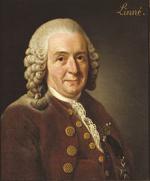Disable ads!
Carolus Linnaeus
Carl Linnaeus (/lɪˈniːəs/; 23 May[note 1] 1707 – 10 January 1778), also known after his ennoblement as Carl von Linné (Swedish pronunciation: [ˈkɑːɭ ˈfɔnː lɪˈneː] ( listen)), was a Swedish botanist, physician, and zoologist, who laid the foundations for the modern biological naming scheme of binomial nomenclature. He is known as the father of modern taxonomy, and is also considered one of the fathers of modern ecology. Many of his writings were in Latin, and his name is rendered in Latin as Carolus Linnæus (after 1761 Carolus a Linné). Linnaeus was born in the countryside of Småland, in southern Sweden. He received most of his higher education at Uppsala University, and began giving lectures in botany there in 1730. He lived abroad between 1735 and 1738, where he studied and also published a first edition of his Systema Naturae in the Netherlands. He then returned to Sweden, where he became professor of medicine and botany at Uppsala. In the 1740s, he was sent on several journeys through Sweden to find and classify plants and animals. In the 1750s and '60s, he continued to collect and classify animals, plants, and minerals, and published several volumes. At the time of his death, he was one of the most acclaimed scientists in Europe. The Swiss philosopher Jean-Jacques Rousseau sent him the message: "Tell him I know no greater man on earth." The German writer Johann Wolfgang von Goethe wrote: "With the exception of Shakespeare and Spinoza, I know no one among the no longer living who has influenced me more strongly." Swedish author August Strindberg wrote: "Linnaeus was in reality a poet who happened to become a naturalist". Among other compliments, Linnaeus has been called Princeps botanicorum (Prince of Botanists), "The Pliny of the North," and "The Second Adam". In botany, the author abbreviation used to indicate Linnaeus as the authority for species' names is L. In older publications, sometimes the abbreviation "Linn." is found (for instance in: Cheeseman, T.F. (1906) – Manual of the New Zealand Flora). Linnaeus' remains comprise the type specimen for the species Homo sapiens, following the International Code of Zoological Nomenclature, since the sole specimen he is known to have examined when writing the species description was himself.[note 2]
 Read more on wikipedia.org Read more on wikipedia.org
 All quotes by Carolus Linnaeus All quotes by Carolus Linnaeus
 Edit Edit
|

|
|
|
|
|
Background photo by Giuliana
|